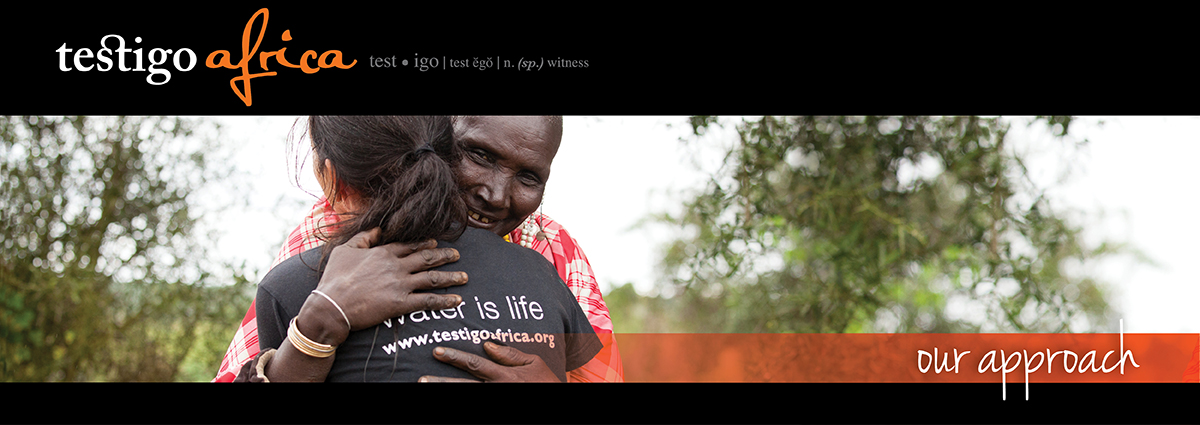We listen first, then act
We think it is really important to listen first. We invest a lot of energy immersing ourselves in the community we are going to work with, to find out what issues are important to the community, and where this aligns with what we have to offer. Then, we respond. The community is integral to coming up with the project concept and its design.
We know that community participation is essential – without it, we wouldn’t exist
Testigo Africa was established in 2009 following the request of Masai villagers to bring clean water to their village of Longido, Tanzania. Our permaculture projects were also driven by a Masai community’s wish to improve access to fresh food by introducing sustainable food production to their village. We know that a project won’t succeed unless it is asked for and owned by the community. All our projects involve the community at all stages – from the initial idea through to delivery. In all our projects with the Masai of Tanzania, we work and cooperate with local government, household heads and sub-village and village chairmen through all project stages.
We make sure our results are sustainable
Our results are sustainable because we work through a model of replication and exponential expansion. We train project participants to become trainers themselves, who then go on to train their peers, parents and friends. Some go on to become trainers in our next projects. Each group we train in sustainable food production using permaculture techniques is provided with continued access to necessary tools and support. All techniques are taught and implemented using locally available materials at low or negligible cost.
We build capacity, and keep it local
We employ local staff instead of expats and local members of the indigenous community that we are working with. Our Tanzania Project Assistant speaks Maa, Swahili and English. Our original trainer in sustainable food production is a local who has more than eight years’ experience in agriculture projects including preparing permaculture demonstration plots and training communities. We employ Masai trainers we have trained in Testigo's approach and model and who have shown themselves to be leaders by example by embracing the permaculture techniques in their own villages and homes, and we engage Masai tradesmen to carry out specialised work.
We come up with solutions that solve multiple problems simultaneously
We put a lot of effort into smart project design, to make sure we squeeze as much as we can out of every ounce of investment. Our projects address multiple issues, rather than narrowly focusing on one. Our model addresses food and water insecurity, gender inequality, poverty and poor health and education.
We think that development should be sustainable
Well yes, everyone says that. But what do we really mean? To us, sustainable development means that the results of our projects can be sustained over time and our projects encourage environmentally and socially sustainable practices and build economic resilience.
Our projects deliver sustainable results
The on-training of women by beneficiaries in our project contributes to a streamlined project with ongoing and sustainable benefits. Our pilot project demonstrated that training 100 women in one growing season can indirectly benefit 1,250 other women, men and children because of the on-training of women by those who have been trained. Our trainee's stories demonstrate how families continue to benefit from their garden plots, as their main source of fresh food and as an income stream.
Our projects are socially sustainable
We ensure our projects are acceptable to the communities we work with. We focus on women’s empowerment in a culturally appropriate way. In our permaculture project we are introducing gender balance into new spheres of Masai life – food production is new, an opportunity to address gender inequality.
Our projects are ecologically sustainable and beneficial
Our permaculture project regenerates the natural environment and uses recycled materials. We have a positive environmental impact through growing food on previously non-productive household owned land.
Our project design is responsive
Our plans are flexible and nimble, allowing us to overcome barriers as the project unfolds. We make sure we can work around external interruptions like cultural events. We shift our focus to enthusiastic participants. We respond effectively to barriers posed by the climate and pests.
We work with enthusiastic project participants
We only invest in people who are as excited as we are about what we can achieve. We understand that there isn’t any point pushing people to change their lives and don’t waste precious resources doing so.
We start young
We appreciate the importance of multi-generational training and knowledge transfer, and the great privilege and honour of being an integral part of educating children in life skills that can truly change their futures. Working with local teachers, we train students in primary and secondary schools, knowing that the training and school community gardens we help create not only instill new skills but provide greens for school meals.
